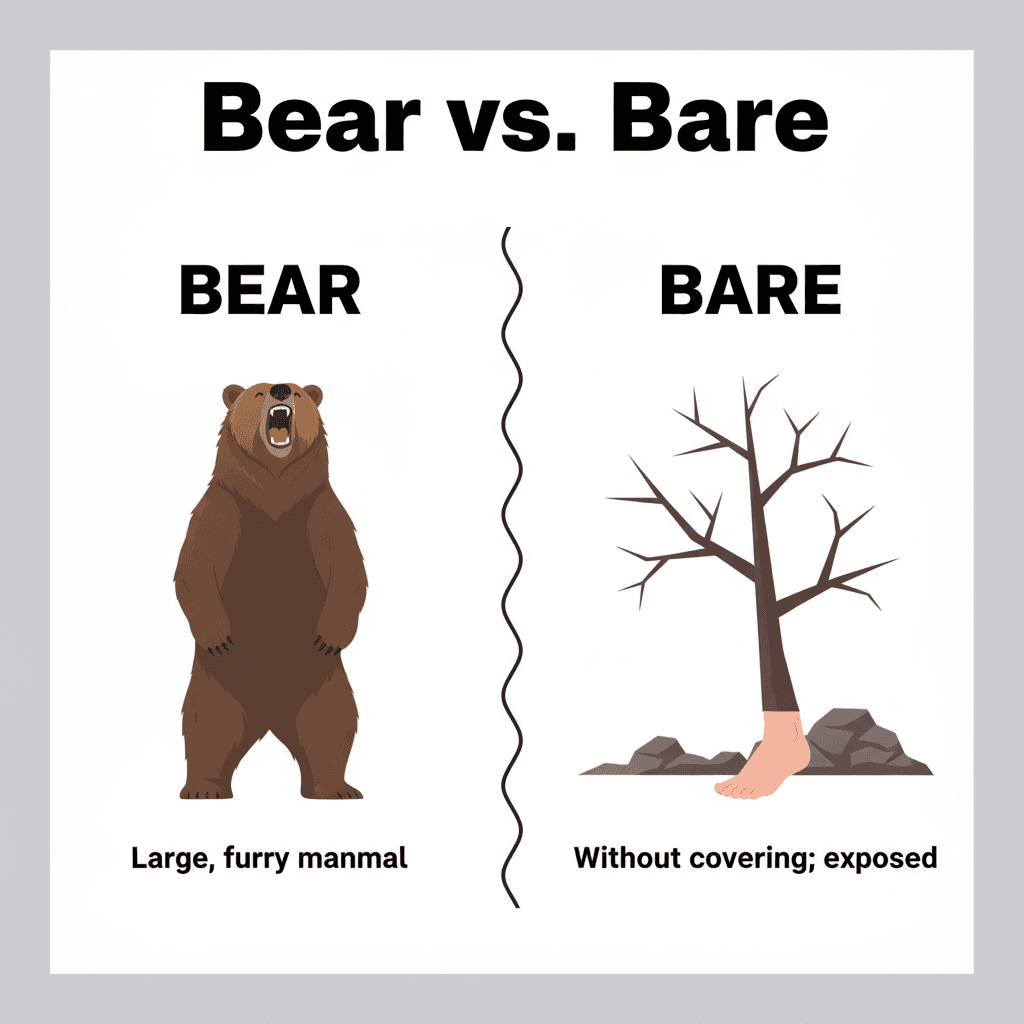Bear vs. Bare: What’s the Difference?
 Bear and bare are homophones — they sound the same but have different spellings and meanings.
Bear and bare are homophones — they sound the same but have different spellings and meanings.
Here’s how to tell them apart easily.
Bear: To Carry, Endure, or an Animal 🐻
Meaning
“Bear” can be both a verb and a noun.
- As a verb, it means to carry, endure, or give birth to.
- As a noun, it refers to the large furry animal.
Examples (10 total)
- I can’t bear this pain anymore. (endure)
- She will bear the responsibility for her actions. (carry)
- Please bear with me while I fix this. (be patient)
- The bridge can bear heavy loads. (support)
- She bore a son last year. (past tense — give birth)
- I can’t bear to see you cry. (endure emotionally)
- He couldn’t bear the pressure of the job. (tolerate)
- The tree bears fruit every summer. (produces)
- We must bear the consequences of our choices. (accept)
- We saw a bear in the forest. (animal)
🧠 Tip:
If you can replace it with “carry,” “endure,” or “tolerate,” use bear.
Bare: Exposed, Naked, or Empty 🌿
Meaning
“Bare” is an adjective (and sometimes a verb) meaning not covered, unclothed, or simple.
Examples (10 total)
- He walked on the hot sand with bare feet. (uncovered)
- The room looked bare after we moved the furniture. (empty)
- She told me the bare truth. (plain, unembellished)
- The walls were completely bare. (empty)
- He went out with a bare head in the cold. (uncovered)
- The shelves were bare after the sale. (empty)
- She held the baby in her bare arms. (without covering)
- The trees were bare in winter. (without leaves)
- We barely had the bare essentials to survive. (minimum)
- Please bare your arm for the injection. (expose — verb use)
🧠 Tip:
If it’s about something uncovered or empty, use bare.
Quick Comparison Table
| Word | Part of Speech | Meaning | Example |
|---|---|---|---|
| Bear | Verb / Noun | To carry, endure, or the animal | I can’t bear this pain. |
| Bare | Adjective / Verb | Uncovered, naked, simple | The room looks bare. |
Common Phrases
| With “Bear” | Meaning |
|---|---|
| Bear with me | Be patient |
| Bear in mind | Remember |
| Bear the cost | Pay or accept responsibility |
| Bear fruit | Produce results |
| Grizzly bear / Polar bear | Animal species |
| With “Bare” | Meaning |
|---|---|
| Bare hands | Without tools |
| Bare minimum | The least possible amount |
| Bare truth | The plain truth |
| Bare skin | Exposed skin |
How to Remember the Difference
👉 Bear = carry or endure (or the animal 🐻)
👉 Bare = naked or empty
💡 Memory Trick:
“A bear carries weight — bare shows skin.”
Why It’s Easy to Confuse
They sound identical, but only bear can be used as a verb meaning endure or carry.
Even advanced writers sometimes mix them up — which is why Humanizey helps catch these subtle word-choice mistakes automatically, keeping your writing natural and error-free.
FAQs
1. Can “bare” mean “to reveal”?
Yes! Example: Please bare your arm for the shot.
2. What’s the past tense of “bear”?
Bore. Example: She bore the pain silently.
3. Is “bare with me” correct?
No! It should be “bear with me”, meaning please be patient with me.
4. Can “bear” mean “to produce”?
Yes. Example: This tree bears fruit every summer.
Practice: Choose the Correct Word (“Bear” or “Bare”)
(Answers are listed at the end.)
- Please ___ with me while I explain.
- He walked on the ___ floor.
- I can’t ___ this noise any longer.
- The walls were completely ___.
- We saw a ___ in the forest.
- She had to ___ the pain quietly.
- The room was cold and ___.
- The cost will be ___ by the company.
- The child’s feet were ___.
- I can’t ___ to watch this movie again.
Answers
- bear
- bare
- bear
- bare
- bear
- bear
- bare
- bear
- bare
- bear
